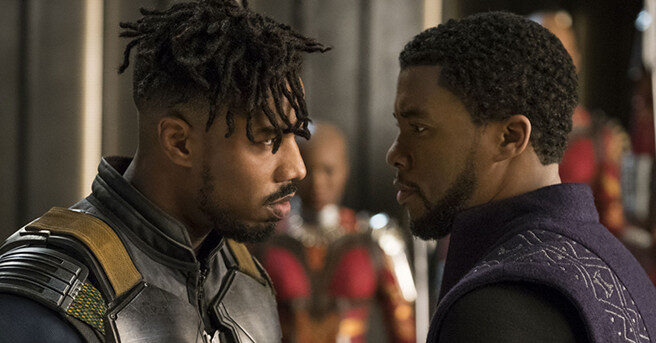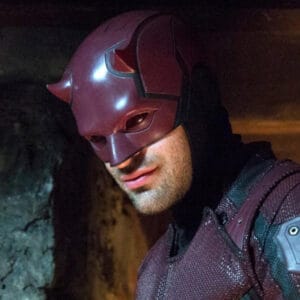Last Updated on July 30, 2021
PLOT: After his father was killed by a terrorist, T’Challa, the Black Panther, is tasked with sitting on the throne in his native Wakanda. But the reemergence of an old enemy, and the arrival of a new one, could end his time as king before it’s even truly started.
REVIEW: At the moment I’m not certain if BLACK PANTHER is the best Marvel movie yet, so I’m not going to declare it as such. I’m sure we’re all sick of hearing that proclamation after every single one of these movies is released anyway. But I am quite sure that it’s the most unique Marvel offering yet; visually and spiritually dazzling in a most refreshing way for this scale of popcorn movie. It invites us into a world that is wholly one-of-a-kind while still ensuring that it checks all of the boxes that makes the best Marvel movies special (dynamic heroes, exciting set-pieces, humorous exchanges between extraordinary people). It’s a superhero movie with a bunch of thrilling visuals in it, sure, but more than that it’s an epic about a people, their heritage, their traditions, their future. Potent stuff for the Marvel gang, and an encouraging sign that, even at this stage in their history, they’re not willing to do the same thing over and over.
It’s rather stunning how completely spot-on producer Kevin Feige is when it comes to hiring directors; the track record is nearly flawless. (You win $1 million if you predicted CLOWN director Jon Watts would be the right man for the SPIDER-MAN: HOMECOMING job.) BLACK PANTHER was helmed by Ryan Coogler (FRUITVALE STATION, CREED), who proves to be another inspired choice, bringing his knack for compelling drama into this surreal universe. At the heart of BLACK PANTHER are complicated people with complicated relationships. Old and new wounds inform who they are and what they do, and though it’s really cool they have all this ridiculous technology and abnormal abilities at their disposal, it’s the dynamics between these characters that captivate the audience. Coogler, who also co-wrote the script, handles the film’s immense action scenes just as well as he does the dramatic ones; the movie has visual flair to spare.
This review is more or less spoiler-free, so I won’t go into the plot very much. Besides, there is a lot going on here, all of it stemming from T’Challa (Chadwick Boseman) – the Black Panther himself – being crowned King of Wakanda in the wake of his father’s untimely death at the hands of Baron Zemo. Still hurting from that event, T’Challa now has to contemplate his future as the ruler of this magical place, where incredible technology co-exists alongside more customary African ways of life. Disturbing him further is the reemergence of an enemy of his people: Ulysses Klaue (Andy Serkis), an arms dealer who has stolen some of Wakanda’s most precious resource, the indestructible metal known as Vibranium, which essentially powers everything in the country. Klaue is making trouble, attempting to sell the metal with the help of a mysterious but very capable mercenary called Killmonger (Michael B. Jordan), and T’Challa – with the assistance of his trusted general Okoye (Danai Gurira) and inventor sister Shuri (Letitia Wright) – aims to bring him to justice.
Sounds like basic stuff, but BLACK PANTHER’s screenplay doesn’t just play out like some James Bond knockoff. The hunt to stop Klaue is only a gateway to meaningful revelations about T’Challa’s father, the true identity of Killmonger and what awaits the Wakandan people. Coogler allows us to spend a lot of time in Wakanda and it’s nothing short of a sight to behold. I could see five more BLACK PANTHER movies just in order to take a closer look around this place. Central to the film’s drama is the question of whether or not the Wakandans should reveal to the world what they’re capable of. Do they share their Vibranium with other places that need it? If so, would it cost them their way of life, as a plundering of their country would seem inevitable? It’s a fascinating question that haunts many of the characters in the film, and what makes it even more gripping is that there isn’t a clear answer.
T’Challa is a welcome protagonist in the Marvel universe. Many of the Marvel superheroes we’ve gotten to know are larger-than-life personalities, and as the movies have gone on their personas have become somewhat predictable, which is perfectly natural. (Save for maybe Thor; we did not know he was eventually going to become the class clown.) There’s an egoless sense of honor about T’Challa, he’s a man of action and tries his best to be a man of his word. Thankfully, he’s also a man short on one-liners. Boseman is well-suited for the role, giving us a protagonist we like and, crucially, very much respect.
The supporting cast is tremendous, and every single crucial character gets at least one scene to shine (in many cases, several scenes). Perhaps the coolest thing about the rest of the cast is that it’s filled with terrific women. Lupita Nyong’o – as T’Challa’s love Nakia – is a beautiful and strong heroine; not just a pretty face for T’Challa to gaze upon, but a character who has responsibilities and goals. Danai Gurira (no stranger to kicking ass on The Walking Dead) is ideally cast as Okoye, T’Challa’s right-hand woman. She gets plenty to do, but a showstopper is a fight scene in a casino where she really makes an impression on a handful of unlucky dudes. Speaking of making an impression, Letitia Wright is phenomenal as T’Challa’s tech-genius little sister Shuri, whose bright, cheerful demeanor is in most ways an antithesis to her brother’s solemn stoicism. I don’t believe I’ve seen Wright in anything before this, but this clearly won’t be the last time, as she steals almost every scene she’s in.
And we should talk about Michael B. Jordan‘s Erik Killmonger for a minute. I really enjoy almost every one of Marvel’s movies, but it’s as clear to me as it is to anyone else that they’ve had issues making their villains as compelling as their heroes. (I did recently dig Michael Keaton‘s Vulture in SPIDER-MAN: HOMECOMING, however.) With Killmonger, Marvel finally gives us a great bad guy; a bitter, indignant son of Wakanda who can’t wait to unleash his venom upon his own people and the rest of the world in equal measure. Jordan’s performance is fittingly intense, and more than a match for the character, who thankfully isn’t just a predictable baddie who wants to blow up the universe. Wisely, Coogler and co-writer Joe Robert Cole make sure to give Killmonger several layers that allow us to empathize with him; it’s not a mindless quest for power that fuels his actions, but something much deeper and more personal. Still, he’s a really nasty customer, and it’s great to see one of these movies deliver a villain that you feel a very palpable dislike for.
It’s tough to even scratch the surface of what makes this movie so satisfying. There are so many elements that make it special, like the frequent trips to a plane of existence where you can be reunited with a dead relative. These sequences are quite remarkable in their emotional resonance, especially in a movie that is, some would assume, just another superhero movie. But BLACK PANTHER time and time again proves it’s not just another superhero movie. It’s a very vivid, imaginative piece of filmmaking, and one that is not just for fans of these films or the comics that have inspired them. So many people will enter the Marvel universe for the first time with BLACK PANTHER, and what a great introduction it will be.






















Follow the JOBLO MOVIE NETWORK
Follow us on YOUTUBE
Follow ARROW IN THE HEAD
Follow AITH on YOUTUBE